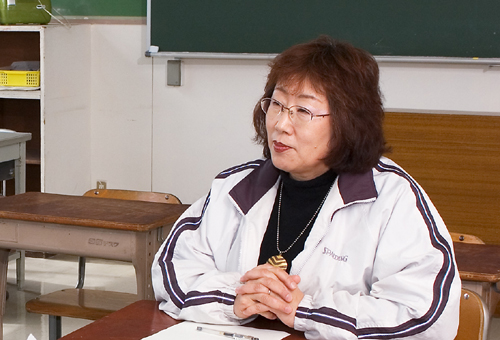Environmental Activity Interviews
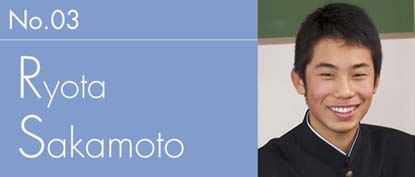
Name
Ryota Sakamoto
-Blaze of the sun got him interested in environmental issues
Ryota grew up in Australia until seventh grade. There, the sunshine was so strong they had to literally besmear sunscreen on their whole body. Not wanting to be bothered by it, Ryota started to research ways he could avoid it and eventually learned of the destruction of the ozone layer. It was one of the reasons for the strong blaze of the sun. The ozone layer filters out the ultraviolet ray harmful to our body, but it is being destroyed by Freon gas in recent years, resulting in an expanding ozone hole. As a result, more ultraviolet ray reaches the earth and could cause skin cancer among many other health problems. Ryota learned of these facts through his research, became more interested in the topic, and wanted to discuss the ozone layer with others. It was around that time that he learned about the Children's World Summit for the Environment.
-The opportunity to discuss the ozone layer immediately presented itself
"I wanted to discuss and exchange ideas on the issue of the ozone layer with other people," says Ryota of his reason for participating in the Children's World Summit for the Environment. He put in himself for the Summit and, to his excitement, was chosen to be on the Junior Board as well. The opportunity to share his thoughts on the ozone layer presented itself earlier than he expected. At the conference in America, in which all Junior Board members attended, the destruction of the ozone layer was one of the themes of the meeting. Ryota prepared a poster and displayed it in the art hall. Later, he was given a chance to discuss the issue thoroughly with other members. It was a great moment in which his wish to exchange thoughts with others on the topic was finally fulfilled.
-The chat conferences – the difficulty of organizing the event
Having been chosen as the member of the Junior Board, Ryota's enthusiasm for the Summit grew stronger. "The Junior Board plans and runs the Summit. I wanted to take a leadership role as the representative of Japan. I wanted to create an atmosphere in which Japanese children could express themselves and share their ideas more aggressively," says Ryota looking back at this time. But the days leading up to the opening day of the Summit was by no means easy. "Once a week, for about an hour each time, we held chat meetings on the internet. It was hard coming up with topics and ideas before those meetings. It was also really tough making decisions in the limited time provided." He also mentioned the difficulty of arranging such meetings with his group members who were living all over the world in different time zones.
-The encounter with a new theme at the Summit
Ryota overcame difficulties of planning the event and actively exchanged ideas with participants from all over the globe at the Summit. "Although we live in different countries, I felt strongly that our wish to protect the environment was the same," said Ryota. His interests in the environment seem to have expanded over the course of the Summit. He encountered a new theme, energy reclamation. "I'm interested in photovoltaic generation, wild power generation, and the generation of power by the force of waves. I want to research energy reclamation and the production of energy using the force of nature that doesn't produce hazardous material." His spirit of investigation, not limited to the issue of ozone layer, will most definitely continue to expand in many directions.
-After the Summit, the environmental activities took a new turn
Before the Summit, Ryota was involved in activities such as cleaning the river and collecting disused articles with the junior club in his region. After the Summit, however, his activities started to evolve further. One of the things he took up was to speak to others of the issue concerning the environment. At the school festival he gave a presentation on his participation at the Summit and emphasized the importance of environmental conservation. At the English Speech Contest held by the city of Toyota, he repeated this claim in his speech. He also took part in the tree planting event held by Toyota city. Ryota talks about his new insight gained at the Summit as follows. "I always thought it was important to start with small things I can do in my daily life. But I learned that people who strongly felt for the environment were doing much bigger things like recycling computer parts. I want to be involved in such big activities."
-Realization of the power of eight hundred children coming together
Ryota strongly felt that although each person's effort may be little, when eight hundred children come together like we saw at this Summit, it could form into a great force. Ryota said, "By the time my generation has children, I wish it would be commonplace to protect the environment and to create a society that can coexist with the green. To make this happen, it would be important for us to create a society of adults which values and takes care of the environment." When asked of his dream, he told us of his hope to take part in the Youth Summit if it is held in the future. "In my daily life, such as when I use paper to absorb disused oil, I often wonder of ways to recycle it instead of wasting it. It might be a good idea to become a scientist who can recycle things like disused oil," said Ryota shyly at the end of the interview.
-An Interview with Ryota's homeroom teacher, Ms. Miki Matsubara * The Summit helped him mature as a person
According to Ms. Matsubara, Ryota was more on the aggressive side even before participating at the Summit, which we understood when she told us he had come forward to become the class representative himself. She felt he had a backbone stronger than what others had expected from his rather reserved exterior. Ms. Matsubara, who teaches English, had witnessed many returnee students from abroad who would shrunk back in the classroom. Ryota, however, was the complete opposite. When it came to environmental issues, especially, he became agile. "He seemed to be glowing with vitality at the Summit. He must have been happy to be accepted to join the event he had aspired to attend. I felt the growth in him when he returned from the Summit. He was always able to speak of his thoughts but that ability had become more refined," said Ms. Matsubara.
-Grow up to be adults involved in activities toward the environment on a global perspective
We asked what Ms. Matsubara wishes the children to learn about the environment before growing up into adults. "We discuss the environment in our integrated studies period but are confined to the limits of the classroom. Therefore, I hope our students will follow in Ryota's footsteps and start to get involved in activities outside of the school hours. I would like them to think about the environment on a global perspective as they will continue to live on this earth for years to come. I hope they will grow up to be adults with a mindset to protect the earth and also hope it will become commonplace to do so in the society." Ms. Matsubara, it seems, shares the same feelings with Ryota toward the environment.
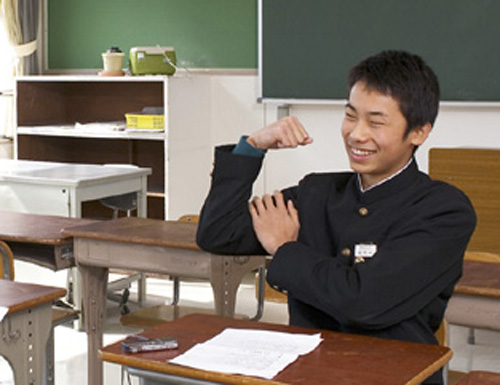
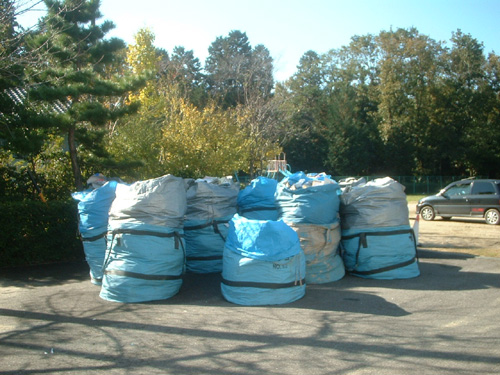
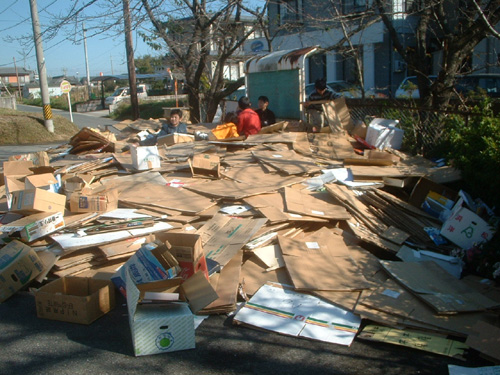
Ryota, taking part in activities collecting disused articles as a junior club member in the region.
